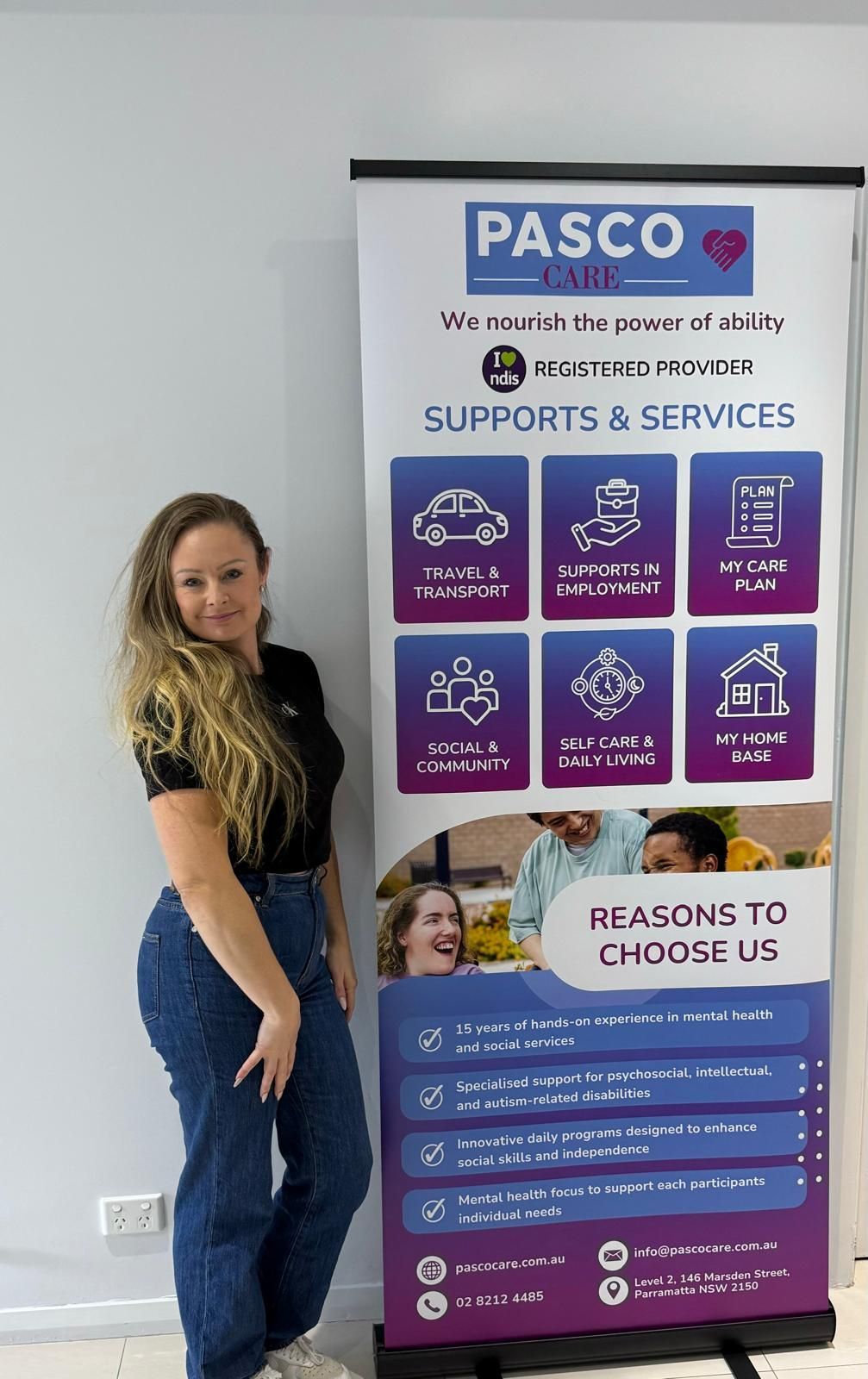Get in touch
02 8212 4485
info@pascocare.com.au
Building Confidence and Independence for People with Intellectual Disabilities
Understanding Intellectual Disabilities and How Support Helps
Living with an intellectual disability comes with unique challenges and opportunities. With the right support, everyone can lead a fulfilling and joyful life.
This page explores how personalised services can empower individuals to thrive. If you or someone you care about is living with an intellectual disability, help is available.
You don’t have to figure it all out alone. Support services are here to make life easier and more rewarding
What Is an Intellectual Disability and How Does It Impact Daily Life?
An intellectual disability affects learning, problem-solving, and everyday tasks. It varies from person to person.
Some may need help managing daily activities, while others seek guidance for specific goals like finding a job or building relationships.
For example, someone might need assistance creating a weekly schedule or understanding how to budget. Support services help make these tasks manageable, increasing confidence along the way.
Support for Everyday Tasks
Daily tasks like cooking or cleaning can feel overwhelming. Support workers turn these challenges into opportunities to build new skills.
Step-by-step guidance helps make these activities achievable and rewarding.
For instance, a support worker might assist with planning a meal, shopping for ingredients, and cooking together. Each completed task becomes a step toward greater independence and self-confidence.
Create a Safe and Stable Living Environment
A stable home makes a huge difference. Supportive living arrangements offer comfort and security. Whether it’s shared housing or independent living, the goal is to create a space where you feel at ease.
Imagine living in a home where your preferences are valued and your needs are met.
You might have a private room, understanding housemates, and dedicated workers who ensure the environment feels welcoming and supportive.
Opportunities for Learning and Employment
Learning new skills or exploring job opportunities can open up exciting possibilities. Personalised programs align with your interests and strengths.
For example, someone who loves working with animals might pursue volunteering at a pet shelter.
Support workers help with creating resumes, preparing for interviews, and exploring job options. The focus is on making education and employment accessible and meaningful.
Build Connections in Your Community
Connecting with others is essential for a meaningful life. Social activities and community events foster belonging and create opportunities to meet new people.
For instance, joining a gardening club or attending a local art class can lead to lasting friendships.
Social outings, like visiting a park or attending group events, encourage connection and confidence. These experiences inspire new hobbies and strengthen a sense of community.
Prioritise Health and Well-being
Good health supports a happy life. Access to allied health services, such as counselling or physiotherapy, promotes physical and mental well-being. Regular check-ups ensure that individual needs are met.
For instance, a physiotherapist might guide mobility exercises, while a counsellor helps manage stress. These services work together to support overall health and confidence.
What Types of Support are Available for People with Intellectual Disabilities?
Support services cater to daily living, social connections, and skill-building. Examples include:
These services aim to help with independence and quality of life.
Who Can Access Support Services?
Eligibility depends on the level of assistance required and how the disability impacts daily living. For example, individuals who need help managing tasks or building skills may qualify.
If you’re uncertain about eligibility, guidance is available. Support workers can help explain the process and gather the necessary documents to ensure you access the right services.
How Do I Apply for Support Services?
Applying for support starts with the National Disability Insurance Scheme (NDIS).
Begin by submitting an access request and providing documentation from a healthcare professional about how the disability affects daily life.
Once approved, a personalised plan is created to outline the supports available.
If the process feels overwhelming, support workers are there to guide you every step of the way, ensuring clarity and confidence.
Let’s Clear Up Misconceptions About Support Services
Some people believe that support services are only for severe disabilities. This isn’t true. Services cater to a wide range of needs, from managing daily tasks to developing social skills.
Another common myth is that receiving support reduces independence. On the contrary, support services empower individuals by building confidence and enhancing skills.
For example, learning how to manage finances or use public transport independently fosters lasting self-reliance.
Take the First Step
Support services for intellectual disabilities focus on creating opportunities and building confidence.
Reach out to Christie today to explore your options. Support is ready to guide you, every step of the way
Loved and recommended by Athletic Koala NDIS Website Team


